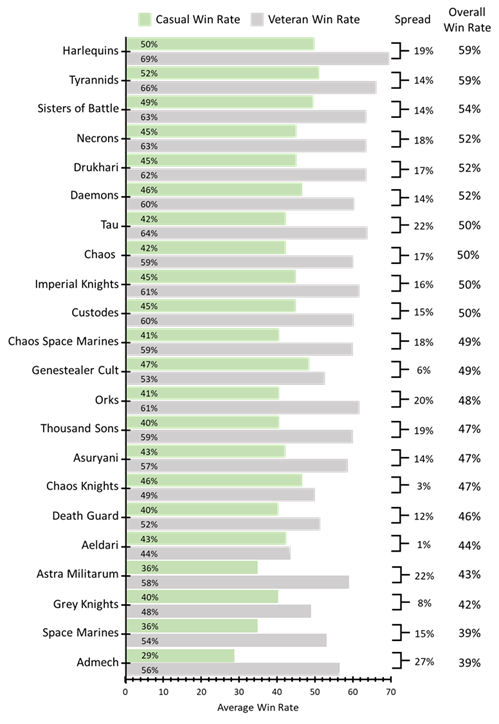Do New Space Marine Players Lose More Than Other Factions?
This week we have a guest article from Zach Comeau who made great use of our Meta Data Dashboard to investigate some of the conclusions from Warhammer Community's Metawatch article. Food for thought, and always great to see the competitive 40k community using data in interesting ways!
Author: Zach Comeau
In GW’s recent MetaWatch video they mentioned a faction “stereotype”:
“Something like space marines… everyone’s got them, but most people when they first start playing aren’t that great competitively… a human interpretation of the data is required”
When I heard this comment, I had a laugh and shared it with my marine playing roommate, as intuitively it seemed correct - marines are often the first army people play in 40k, and newer players tend to be worse at the game.
The more I thought about it however, I began to question, is this reflected in tournament results?
Well lucky for me, Stat-Check has been collecting GT+ (25+ players, 5+ rounds) tournament results and tracking veteran (people who have attended more than one GT) versus casual (their first GT) performance throughout Nephilim.
While this is a relatively crude method to assay experience, we see that right off the bat, veterans on average are winning 59% of games, while casuals only win 43% of games yielding a veteran-casual win-rate spread of ~16%. This average 16% spread I think lends credence to the value of the veteran versus casual win rate data – just attending one GT+ event makes you (on average) win 16% more games at your later GT+ events.
Figure 1. Average casual versus veteran GT win rates. Win rates of players who attended their first GT+ event (casual), plotted against players who have attended at least one (veteran) GT+ event. Of 34,239 games, 38% of players were veterans, 62% of players were casual. Error bars represent standard deviation.
So, if the stereotypical claims are true, and Space Marine's overall win rate is brought down by casuals, we would expect to see a larger spread between veteran performance versus casual performance but that is not the case.
Figure 2. Casual versus veteran performance for all loyalist marine subfactions (excluding grey knights) and AdMech. For 4646 marine games, 34% veteran, 66% casual. For 483 AdMech games, 37% veteran, 63% casual.
Instead, the average veteran versus casual spread of marine subfactions is ~15%. Indicating that while veteran marine players are definitely better than the casuals, marine casuals are not any worse than any other casual faction on a relative basis. Instead, this data would suggest it is the lacklustre power of the marine codex that is the problem, not the players.
Compared to the other faction at a 39% overall win rate, AdMech, we see instead the largest veteran versus casual spread at 27%.
Veteran AdMech players are winning 56% of their GT tournament games, in line with the overall average veteran player, but casual AdMech players are only winning 29% of their games. The data would suggest then that AdMech is actually fine once you learn them (From a raw balance perspective, that their relative representation is half the average is another matter – people have largely abandoned the faction and that needs to be addressed), it is the casual AdMech players who are struggling, and dragging down the overall win rate.
Furthermore, there is a global average of 62% casual players, (which is cool, the majority of people attending GT+ events in Nephilim are doing it for their first time) and marines are composed of 66% casual players, which while greater than the average, is not significantly so. Marines are not actually “a new player faction” than any other, at least at GT+ events.
These conclusions surprised me as they fly in the face of the traditional faction stereotypes.
Games Workshop has really improved the balancing competitive 40k and I think this is reflected in the increasing popularity of large tournament events. However, tournament composition, and the stereotypes we associate with factions is changing, and it’s worth a deeper analysis of the data before making conclusions about the state of the game.
Zach is a scientist by day and a die hard guard player by night. He enjoys long walks on the beach, math-hammer, and heavy artillery.



